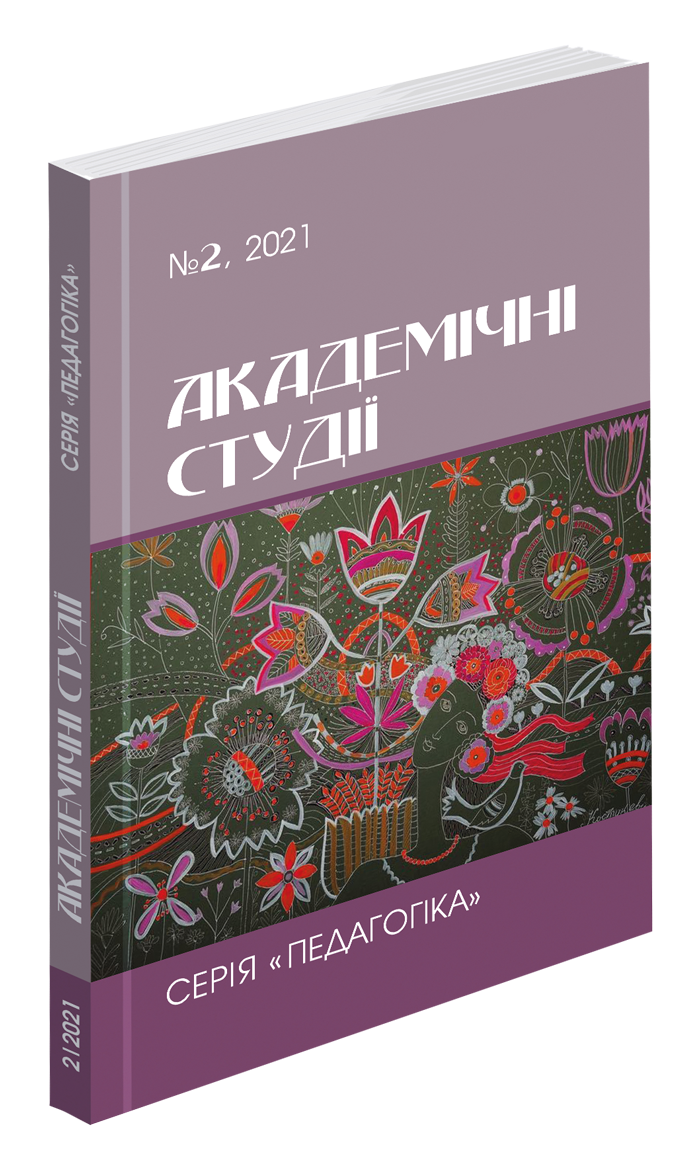Abstract
The article is devoted to the problem of forming the project culture of future teachers in cooperation with the curator of the academic group. The relevance of the study is determined by the need to rethink the educational paradigm and generate new ideas for the modernization of the educational process. It is determined that the professionalism of a modern teacher is determined by the level of formation of his culture of project activities. The aim of the research was the theoretical substantiation of the model of formation of students' leisure culture by means of extracurricular project activities. Theoretical analysis of domestic and foreign scientific and methodical literature, normative-legal documents and legislative base is given. Different author's views on the meaning of the concept of "project culture" are analyzed and it is found that it is a component of professional training of any profile. Student youth is seen as a target with their dreams, desires, interests and values, so the creation of a developmental environment in the educational institution will best stimulate students to project activities and mobility. It has been determined that the curator of the academic group currently acts as a facilitator, coordinator, tutor and academic consultant. The level of formation of students' civic and health-preserving competencies on the basis of the conducted research (questionnaire) among the students of the Municipal Institution of Higher Education "Lutsk Pedagogical College" of the Volyn Regional Council is substantiated. A description of successful projects implemented jointly with local authorities and NGOs is provided. The prospects for the development of project mobility of students of educational institutions within Ukraine and abroad are outlined.
References
Бережна Л. Проектна культура як основний спосіб реалізації інноваційної педагогічної діяльності. Теорія та методика управління освітою. Київ, 2010. № 3. С. 2–4.
Забродська Л., Онопрієнко В., Хоружа Л., Цимбалару А. Інформаційно-методичне забезпечення проектно-технологічної діяльності вчителя: науково-методичний посібник. Харків: Видавнича група «Основа», 2007. 208 с.
Лучанінова П. Куратор академічної групи як ключовий суб'єкт виховної системи ВТНЗО. Духовність особистості: методологія, теорія і практика. Сєвєродонецьк: СНУ ім. В. Даля 2017. Вип. 1(76). С. 120–132.
Молодіжна політика в умовах децентралізації : портал «Децентралізація». URL: https://decentralization.gov.ua/youth (дата звернення: 22.03.2021).
Національна доктрина розвитку освіти України : Указ Президента України від 25.06.2013 р. № 344/2013. URL: https://zakon.rada.gov.ua/laws/show/344/2013#n10 (дата звернення: 23.03.2021).
Професійний стандарт вчителя початкових класів : наказ Мінекономіки від 23.12.2020 р. № 2736. URL: https://nus.org.ua/wpcontent/uploads/2020/12/Nakaz_2736.pdf (дата звернення: 26.03.2021).
Сидоренко В., Брехунець А. Сутність поняття проектної культури. Гуманітарний вісник ДВНЗ «Переяслав-Хмельницький державний педагогічний університет імені Григорія Сковороди». Переяслав-Хмельницький, 2013. Вип. 28, т. 1 : Педагогіка. Психологія. Філософія. С. 270-278.
Сухомлинський В. Вибрані педагогічні твори в 5 томах. Т. 2. Київ: Радянська школа, 1976. 420 с.
Ушинський К. Твори в 6 томах. Т. 1. Київ : Радянська школа, 1952. 123 с.
Хоружа Л. Проектна культура вчителя: етичний компонент. Шлях освіти. Харків, 2006. № 4. С. 11–15.
Sypczenko, W., Sypczenko, О. Praca kuratora w celu kształtowania obywatelskości wśród młodzieży studenckiej. Wychowanie dzieci i młodzieży w społeczeństwie demokratycznym. Warszawa, 2013. С. 132–144.
Lin Ch., Chuang Sh. (2019). Using team projects for making short films to cultivate students’ interdisciplinary competencies. Interactive Learning Environments. URL:https://doi.org/10.1080/10494820.2018.1451900 (Last accessed: 24.03.2021).
Kallio J., Halverson R. (2020). Distributed leadership for personalized learning. Journal of Research on Technology in Education. URL: https://doi.org/10.1080/15391523.2020.1734508 (Last accessed: 22.03.2021).
Siqin T., Kai Wah Chu S. (2019). How students take collective responsibility for productive collaboration: an empirical examination of online discourse. Interactive Learning Environments. URL: https://doi.org/10.1080/10494820.2019.1636081 (Last accessed: 22.03.2021).
